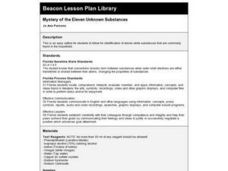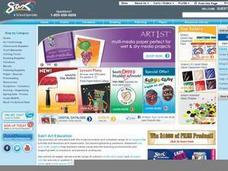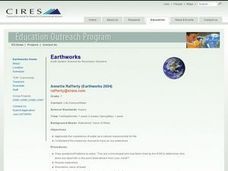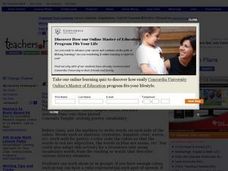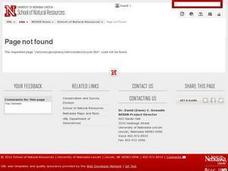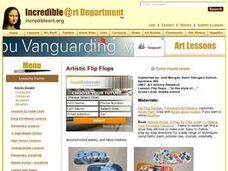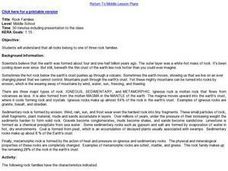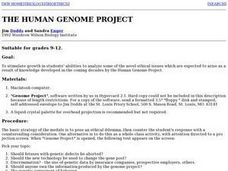Curated OER
Clouds
Second graders explore how to identify cloud types by observing clouds. They record data and have fun by applying newly acquired knowledge throughout the curriculum.
Curated OER
Identifying Words That Name Actions
First graders identify words that name actions as they discuss a variety of Thanksgiving activities.
Curated OER
Heating
Students develop the idea that heat is a form of energy which moves from hot objects to cold ones.
Curated OER
Physical Difference and Classification
Students use a microscope and observation skills to compare and contrast several physical properties and develop a classification system.
Curated OER
Mystery of the Eleven Unknown Substances
Fourth graders identify eleven white substances that are commonly found in the household. They, in pairs, perform experiments on a variety of substances, and must identify them based on the reactions they observe.
Curated OER
Renkly Relief/Collage Painting
Students study the use of texture, and rhythm as a principle of design when showing movement in a painting.
Curated OER
Earthworks
Seventh graders explore watersheds and take samples and analyze the data from a watershed in the area.
Curated OER
Rock Hounds
Second graders read Byrd Baylor's book "Everybody Needs a Rock", and select a rock, study it, and describe its attributes.
Curated OER
Dicey Poetry
Students role cubes prepared with vocabulary and parts of speech on each side. They collect words and create poems from the words collected. They read their poems to the class.
Curated OER
Heritage: Legends, Fairy Tales and the Native Americans
Fourth graders compare and contrast a Native American legend with a fairy tale and share their ideas by creating a venn diagram.
Curated OER
Museum Adventure WebQuest
Students discover the background and properties of minerals. They examine fluorite and record data after testing it. They use the internet to help them discover information about minerals.
Curated OER
Nebraska Rocks & The Rock Cycle
Students study the rock cycle and relate it to rocks that are indigenous to Nebraska. Students collect rocks and draw a diagram of the rock cycle using their collection.
Curated OER
Franklin Mountains
Fifth graders examine photographs of the eastern and western Franklin Mountains. As a class, they discuss what is shown and the different colored rocks and the orientation of the layers. In groups, they are given clay of two different...
Curated OER
Avalanche
Students investigate the concept of avalanches and how they effect people who use the slopes. They conduct research using multiple resources that includes the internet in order to create a final oral presentation.
Curated OER
Quick Freeze (Demonstration)
Students witness an demonstration in which a bottle of club soda will go from a liquid to a solid when it is opened and the carbon dioxide is allowed to escape. This will help them understand that the freezing point of a solution will...
Curated OER
Flip flops....In the style of.....
Learners create a pair of flip flops. Using the internet, they become familiar with the work of a specific artist and make their flip flops in the same design. They write a report on the information they gather about the artist and...
Curated OER
Ocean Market
Students research how: The ocean is the source of many materials, from ores mined from its depths to relaxing mineral salts for a bath. Exquisite mother-of-pearl inlay, decorative shells, and pearl jewelry are found in gift shops...
Curated OER
Dumbing Down
Students explore the definition and derivation of the popular saying "dumb down." Using worksheets and lecture materials, students provide meanings for the phrase when used in varying contexts. They also consider the derivation of each...
Curated OER
Street Cred
Students explore the definition and derivation of the popular word "cred." Using worksheets and lecture materials, students provide meanings for the word when used in varying contexts and when used as a phrase. They also consider the...
Curated OER
Keeping Your English Up To Date: Bless
Learners explore the definition and derivation of the popular usage of the word bless to talk about sweet or cute things. Using worksheets and lecture materials, students provide meanings for the word "bless" when used in varying contexts.
Curated OER
Bling and Sound-Symbolic Words
Students explore the definition and derivation of the popular term "bling" and other sound-symbolic words. Using worksheets and lecture materials, students provide meanings for the word "bling" when used in varying contexts. They...
Curated OER
Rock Families
Students study the three types of rock characteristics; igneous, sedimentary, and metamorphic. They are divided into three groups and each group takes one of the rock characteristics. They then act out the characteristics of their rock...
Curated OER
Are You Being Poisoned by Your Dishes?
Students explore lead poisoning and how it relates to ceramic dishes. They perform an experiment to discover if any of your ceramic ware is leaching lead which might cause lead poisoning.
Curated OER
The Human Geonome Project
Students explore the Human Genome Project (HGP). Students research a fact situation, examine genetic data given, and discuss choices available for a solution. Students consider the ethical question and consequences of each choice.
Other popular searches
- Ice Crystallization
- Water of Crystallization
- Liquid Crystallization
- Crystallization of Minerals
- Sugar Crystallization
- Chemistry Crystallization
- Crystallization of Morphine






